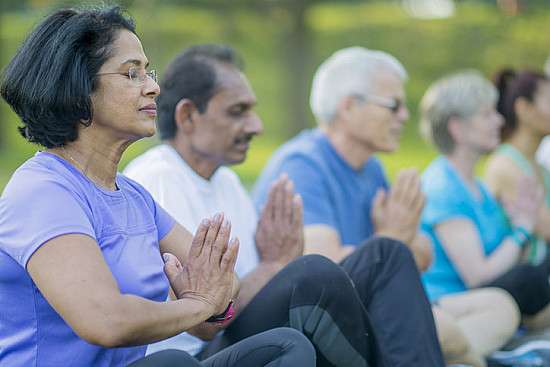Worried about COVID-19?
> Know the facts
Change is stressful, and stress leads to anxiety, negatively affecting our mental and physical health. And while sheltering in place serves the public good, it can affect our mental health.
Susanne Ringhausen, manager of Mental Health and Psychological Services at OSF HealthCare Saint Anthony’s Health Center in Alton, offered some solutions.
“Feeling worried is a normal human response to change or challenge. It’s important during uncertain times to understand the difference between an expected reaction to stress and elevating levels of distress that may trigger a depressive episode or anxiety disorder,” Suzanne said. “Taking time for personal self-care helps us to maintain perspective and prevent concerns from becoming more serious.”
Know the signs of stress
Signs of stress include:
- Abuse of alcohol, tobacco, medications or illegal drugs
- Avoidance of favorite activities
- Behavioral regression like toileting accidents or bedwetting
- Changes in eating or sleeping habits
- Difficulty with attention and concentration
- Excessive crying or irritation in children
- Excessive worry or sadness
- Increased heart rate
- Irritability and “acting out” behaviors in teens
- Stomach and digestion problems
- Unexplained headaches or body pain
If you are feeling overwhelmed with emotions such as sadness, depression or anxiety, or feel like you want to harm yourself or others, call 911 or the Substance Abuse and Mental Health Services Administrative Disaster Distress Helpline: 1-800-985-5990 or text TalkWithUs to 66746. Another option: The National Suicide Prevention Lifeline at 1-800-273-8255.
Manage your stress
Strategies for dealing with stress:
- Find hobbies or activities you enjoy. Plan something small each day to look forward to.
- Interrupt negative thought patterns that cause distress. Instead, focus on what you can do to make this situation better.
- Listen to your body. Take deep breaths, stretch or take a moment to relax. Focus on eating healthy, well-balanced meals, getting regular exercise and sleep and avoiding alcohol or mood-altering drugs.
- Limit exposure to news coverage, including social media. This goes double for children. They may misinterpret and become frightened about something they don’t understand.
- Maintain regular routines. Create a schedule for learning activities, relaxation and fun.
- Talk to trusted people about your concerns and feelings. Use your phone or safe internet means to connect with others in a positive way.
- Talk about the COVID-19 outbreak – answer questions and share facts.
Know the facts
One sure way to defuse a stressful situation is to know the facts. Obtain the latest information from credible public health resources such as the Centers for Disease Control and Prevention (CDC) or your state Department of Public Health (Illinois – Michigan). Misinformation spreads quickly and increases anxiety and alarm.
“You can experience some mixed emotions from isolation, worrying about your health and the health of your loved ones,” Susanne said. “Understand that it may take time to get back to your usual routine. Continue to communicate safely with loved ones. Knowing they are safe and healthy will reduce your stress.”
If you are experiencing increased anxiety or stress, you have 24/7 access to the OSF HealthCare online platform for behavioral health, OSF SilverCloud. OSF SilverCloud provides access to online behavioral health tools, and can connect you to in-person resources or telehealth services.
Last Updated: December 21, 2021
Managing stress during the ongoing COVID-19 pandemic
Are you feeling stress, fear and anxiety amid the ongoing COVID-19 pandemic? If so, you’re not alone. The recommendations for masking and social distancing affect nearly every part of our lives, including finances, relationships, transportation, jobs and healthcare.
Some common causes of stress during the coronavirus pandemic are uncertainty, lack of routine and reduced social support, says Mark Flanagan, LMSW, MPH, MA, a social worker at Cancer Wellness at Piedmont.
Routines and COVID-19
As humans, we don’t like uncertainty and tend to thrive in routines, says Flanagan. Routines are essential because they create a sense of normalcy and control in our lives. This sense of control then allows us to manage the challenges that come our way.
“When we don’t have a routine, much of our time is spent trying to establish one,” says Flanagan. “Without a routine, we often pay attention to the things that are most ‘flashy.’ When big news happens, we tend to focus on it more.”
Social support and COVID-19
Not only are our routines currently disrupted, but the routines of everyone around us are as well.
“When something goes wrong in our lives, we can usually rely on others to get a sense of calm,” he says. “But when everyone is experiencing the same sense of uncertainty, there’s no real ‘anchor’ to help manage some of the stress.”
Stress affects your health
Stress management is essential for good physical health, and it’s especially important right now as our world addresses the COVID-19 pandemic.
“While short-term pressures and stress are normal and can help us change in positive ways, chronic stress causes a huge deterioration in our quality of life on a physical level,” says Flanagan. “When we are more pessimistic, depressed or anxious, our immune system goes down and produces more stress hormones, reducing our immunity and increasing inflammation.”
Stress can also put a strain on your mental health, relationships and productivity, he notes.
Stress reduction tips for COVID-19
“Rather than dwell on nervousness, focus on the things you can control,” Flanagan suggests. “When you move the locus of control from something outside yourself to inside yourself, you powerfully reduce anxiety and boost confidence.”
He suggests the following steps to regain control and reduce stress.
Follow the recommended health guidelines. These guidelines include getting the COVID-19 vaccine, frequent hand-washing, wearing a mask in public places, social distancing, practicing respiratory etiquette and cleaning commonly used surfaces. See the latest recommendations from the Centers for Disease Control and Prevention (CDC). Not only will you protect your health, but you’ll also protect the health of vulnerable people in your community, like older adults and those with serious or underlying health issues.
Create a morning routine. When you’re stuck at home, it can be tempting to let go of basic routines, but Flanagan says a morning routine can help you feel more productive and positive. Consider waking up at the same time each day, exercising, showering, meditating, journaling, tidying your home or having a healthy breakfast as part of your morning ritual.
Check in with loved ones regularly. Staying in touch with family and friends can help reduce stress.
Consider ways to help others. This can include picking up groceries for a neighbor and leaving them at their door, donating to a local charity, or purchasing gift cards from your favorite restaurant. By taking the focus off yourself, you can experience reduced stress and a greater sense of well-being.
Have a daily self-care ritual. Self-care can include exercise, meditation, walking outside, reading, taking a bubble bath, painting, journaling, gardening, cooking a healthy meal or enjoying a favorite hobby. Pick one thing and do it at the same time each day. It will help anchor your day and provide a welcome respite.
Limit news and media consumption. “When we constantly check our newsfeeds and see bad news, it activates our sympathetic nervous system and can send us into fight-or-flight mode,” says Flanagan. He recommends limiting how often you check the news to once or twice a day (ideally not first thing in the morning or after dinner), turning off news alerts, and obtaining information from one or two reputable news outlets.
Set boundaries around social media. “There’s this concept of toxic sociality where we constantly have to be connected, even in superficial ways, and when we’re not, it feels like part of us isn’t being ‘fed,’” he explains. “It’s important to practice social distancing with social media too. We may not think we’re having any effect on our newsfeed, but we can take steps to reduce the ripple effect of panic on social media.” He suggests posting positive messages online and being mindful of your likes, shares and comments.
Meditate. Meditation can help restore your sense of control as you focus on your breath or a positive word or phrase. “Meditation can help you activate your parasympathetic nervous system, and that’s an antidote to fear,” says Flanagan. “And when you’re more centered, you’re able to create a calm reality around you.” Try this guided meditation to get started.
Encourage others. “Often, when we are scared, it can be tempting to repeat negative messages, but actively encouraging family and friends is really important,” he says. “Chances are, someone is having a harder time than you are. Your words matter and people will respond accordingly. It’s important to realize we are not victims; we are helping to create our environment and change it for the better. By sending positive messages out into the world, you’ll not only affect those around you, but those words will come back to you.”
Hope during the coronavirus pandemic
“It’s important to remember that this will pass sooner or later,” says Flanagan. “The world has gone through many different challenges, like disease outbreaks, war and uncertain times. For better or worse, these times always pass. That doesn’t mean this time isn’t significantly challenging, but if we focus on what we can control and do things that are good for our health and the health of those around us, we will come out of this in perhaps a more whole state and with a renewed perspective. It’s important to look toward the future and begin building for that future. You can always have hope. Hope never leaves us.”
For information on coronavirus (COVID-19), including symptoms, risks and ways to protect yourself, click here.




